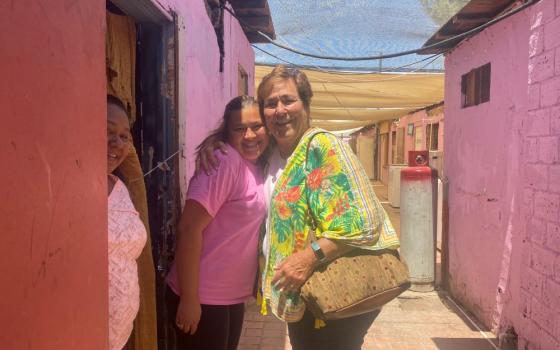Pope Francis has made another brilliant move. His choice to live in Domus Sanctae Marthae rather than the papal apartments adds to his growing image of genuine simplicity. It's also a perfect living situation for a man grounded in the communal tradition of religious life.
In my visits to Rome, I stay at the Curia Generalizia dei Marianisti on Via Latina, the "mother house" of the Society of Mary (Marianists). The description of Domus Sanctae Marthae could also describe Via Latina, as the Marianist Generalate is called. Via Latina has a similar physical structure: simple apartments; large, communal gathering places and smaller, intimate living rooms; shared dining rooms; and several chapels.
There is a similarity in usage also. The permanent residents of Via Latina include those who work for the general administration of the Society of Mary and international Marianist seminarians studying in Rome. Though the house is big, a family spirit pervades the halls. All who work there are known by name, and warm conversations circle around personal lives and events.
The greatest gift of Via Latina is that of hospitality, with a constant stream of guests from around the world. All are welcomed as family and invited to pray and eat with the community.
Meal times are long, lively and punctuated with wine and laughter. If a feast day is being celebrated, they are even longer. There is no rush to leave the table; who would want to? The meal is more than food, though the food is always delicious. The meal is community truly lived and enjoyed.
Visitors provide a new perspective to the table. When I visit, there is a genuine eagerness to hear how things are in Canada, to catch up on the latest news of mutual friends, or to discuss world or church news. For me, experiencing the love and unity amid the diversity is a true taste of heaven.
If all this is similar to the reality of living in Domus Sanctae Marthae, then I understand why Pope Francis would want to live there. I can understand how the resident community and guest house diversity would appeal to our new pope. As a Jesuit, he is a man of community while his personal nature seems to find energy outside the ecclesial walls, eating, talking and praying with a glorious mix of souls.
I am sure that the spirit of community is also present among the staff and residents of the papal apartments. For some, the very public nature of the papacy would demand a more private lifestyle, a place to retreat and re-energize away from the crowds. I don't think they should close up the papal apartments yet. They have their purpose.
The personal choices being made by Francis show that many of the small traditions surrounding the papacy can be changed in order to suit the personality and needs of each pope. This is a very human approach and bodes well for those who will follow him.




